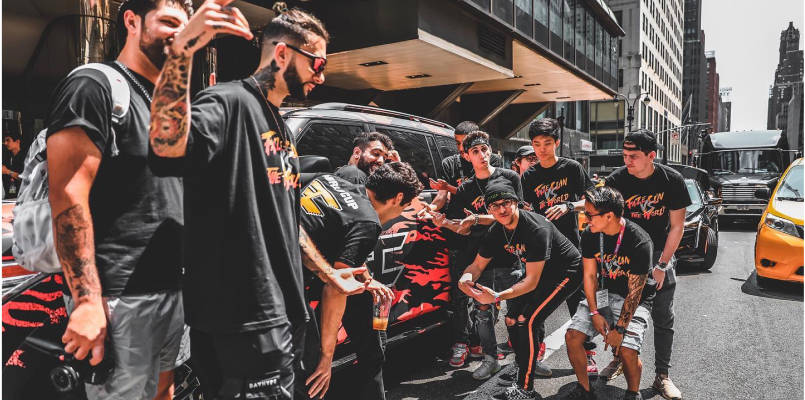Mentioned in this article
American esports organization FaZe Clan was born as “FaZe Sniping” on YouTube in 2010, gaining a reputation for Call of Duty trick shot montage videos. While FaZe still focuses on esports and content creation, it also presents itself as a lifestyle brand with merchandise and apparel.
Despite the team’s exploration of industries beyond gaming, FaZe Clan’s Head of Esports Erik Anderson says it’s all part of the big picture.
“We’re a mainstream gaming organization and we define that by focusing on the lifestyle around what our community pays attention to and cares about,” Anderson told The Esports Observer. “I don’t think you can separate the esports part from the rest of what FaZe is as a whole—it’s a very important part of what we do, but it’s not the only thing that we do. The media and entertainment stuff is equally as important, if not more so.”
In April, Meyers Leonard, a basketball player for the Portland Trail Blazers, announced his investment in FaZe Clan. With so many sports and music entrepreneurs investing in the space, finding the right partners for Faze comes down having the right mix of vision and attitude, explained Anderson.
“Generally speaking, I think it’s more about finding people that understand what it is that we’re doing who believe in it, see the vision of how we’re moving forward, and fit into the company culture,” he said. “There are some cautionary tales out there for the wrong investment money coming in and [having it] dictate where the brand comes from.”

“We’re really protective of that—when new people are coming in [we make sure] that they understand what the guys have built over the better part of a decade and what their vision is going forward.”
FaZe Clan still focuses on shooter games, with FIFA 19 being an outlier. Now that Activision Blizzard has switched Call of Duty to a franchised, city-based league model, legacy brands like FaZe are no longer able to compete under their trademark names unless they cease competition in all other titles. As a result, FaZe Clan’s long-time rivals, OpTic Gaming could be the last legacy brand remaining in Call of Duty.
“It’s a bummer,” said Anderson, “but I also understand from a structural perspective why [Activision needs] to keep consistency in the main product. I see it from both sides. Obviously, from our side, it’s a bit frustrating but we understand where they’re coming from with it. Ideally, there’s a middle ground for some of the brands that want to keep going [in Call of Duty] and hopefully middle ground for some of the fans, too, [so they] still have some connection to the brands from the 10 years or so of competitive Call of Duty that’s come before.
“I think Activision is making an interesting bet on the future and this is their thesis on where they think this space needs to go,” Anderson said, adding that franchising structures like the NBA, NFL, and MLB are unique to North America but largely successful.
Anderson thinks it will take a few years to determine if the new Call of Duty League (CDL) will thrive under the same structure as the Overwatch League (OWL). However, the sheer size of the Call of Duty playerbase could give CDL a chance to succeed, he added.
“[Activision has] proven that they can sell a lot of games and get a large playerbase. I think that as long as they can convert some of that into people showing up on a regular basis, it will succeed,” said Anderson.
Several esports organizations including Dignitas, Misfits, Team SoloMid, and Excel Esports have recently announced or opened dedicated training facilities and/or arenas to interact with local audiences. For FaZe Clan, however, such plans are “a bit further off.”
“I get why some of the teams are putting those facilities in place,” said Anderson. “[However], there’s ample boot camp space out there for our teams to use [while] traveling around the world. For us, we have a lot of players around the world so it is logistically harder to have something until we consolidate everybody in one place. We don’t think it’s fully necessary just yet.”
Editor’s note: This interview was conducted by Graham Ashton.

